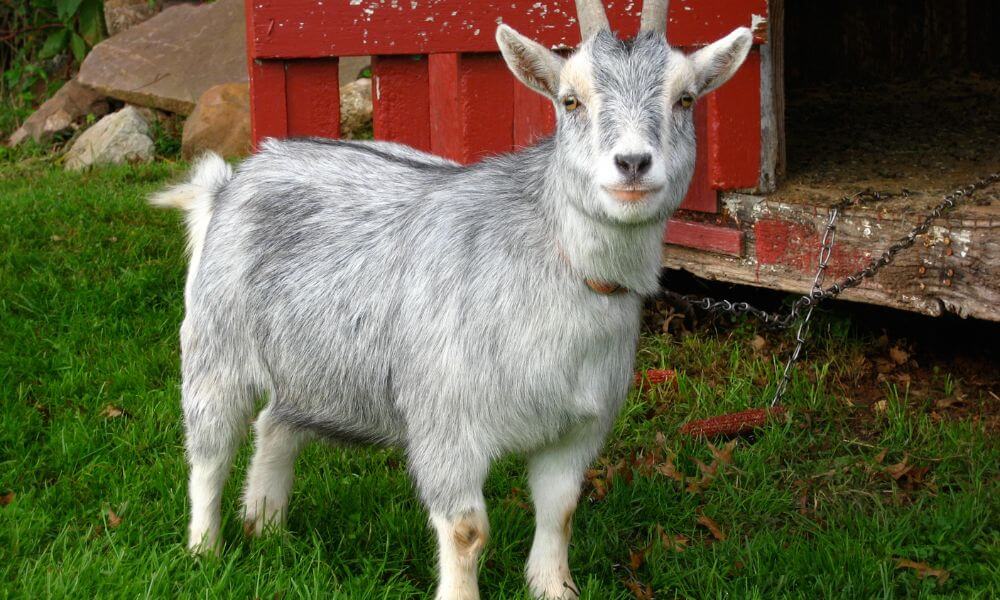Pygmies are kind of an anomaly in that sense, then.
With most goats, it’s vitally important that you milk them every day when they are in season.
If you don’t, their udders can become swollen and can cause a myriad of health complications.
While you should still keep an eye on your pygmy goats, this is generally not a problem for the breed.

Do you have to milk pygmy goats every day?
Usually, no, you don’t.
As I said, in general, pygmy goats produce a much lower milk yield than other breeds.
They haven’t traditionally been selectively bred to produce a lot of milk, so they don’t have a lot of excess in their systems.
That said, the best rule of thumb for goats as a whole is that they do need to be milked every day, once they have started lactating.
If they don’t, then the excess milk builds up in their udders, causing painful swelling.
It can also cause an infection called mastitis, which can be very damaging to their health.
Pygmy goats, by and large, do not have this problem.
They have been bred to be the size that they are because, simply put, small things are attractive as exotic pets!
My point is, pygmy goats generally don’t need to be milked every day like other breeds.
However, this is not universally true, and you should always be vigilant to signs your goat is unwell.
What happens if you don’t milk pygmy goats?
So, as I said, by and large, you won’t have much of a problem.
Pygmy goats don’t need to be milked as much as other breeds do, and they will get by okay without being milked every day.
The consequences, though, of leaving a pygmy goat with an udder full of milk, in the case that you have a pygmy producing an unusually high yield, can be quite dire as I mentioned.
Painful swelling is eventually guaranteed, certainly if there is no kid suckling from the doe.
This painful swelling will lead to muscle cramps and even fatigue if left long enough.
The infection I mentioned, mastitis, is your biggest potential problem.
Left untreated, mastitis can be fatal.
This is why I urge caution.
Even though pygmy goats are generally fine without being milked, you need to be sure that they are fine.
There could be long term consequences to not milking them properly.
If you are milking them, then, how often should you?
How often should you milk a pygmy goat?
If you are milking the pygmy goat, then, again, you will have to take stock of the individual you’re looking at.
There will be some variation between individuals—not a lot, but small amounts can make a difference in a small animal like a pygmy goat.
The rule of thumb for the average sized breed is milking once a day.
Sometimes twice a day for larger breeds—although this usually ends up causing them to produce more milk, and is a tactic for extra yield.
A short milking session once a day would be plenty, then, for a pygmy.
If you don’t want them producing milk, though, you’ll want to slow it down and gradually ease her out.
If you keep milking her, she will keep producing milk.
Reduce to once every two days, once you’re a few months out from the birth.
It goes without saying, of course, that if there is a kid suckling you don’t need to milk the goat.
Do all pygmy goats produce milk?
All females do, yes.
All females that have recently given birth to a kid will produce milk to some degree.
They produce far less than other breeds, but the yield can still be quite high and the fact is they are mammals—all of which produce milk for their new borns to drink.
Males, naturally, don’t produce milk, and females that have not yet given birth will not produce milk.
In terms of reaching maturity, they will usually start being ready to have a kid and produce milk after around a year.
So, the ultimate conclusion is that I would always encourage caution and vigilance.
The general rule is that pygmy goats don’t produce much excess milk, and they are rarely kept as milking breeds.
Therefore, if they have had kids, you should mostly just let the kid consume the milk.
This will naturally keep the udders free.
Nonetheless, you should err on the side of caution and check your goat’s udder to make sure it isn’t full and causing pain.
